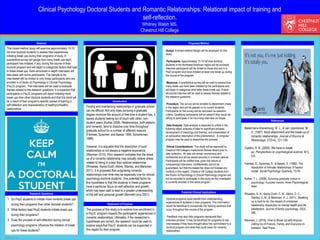More Related Content
Similar to PosterPresentation
Similar to PosterPresentation (20)
PosterPresentation
- 1. TEMPLATE DESIGN © 2008
www.PosterPresentations.com
Clinical Psychology Doctoral Students and Romantic Relationships: Relational impact of training and
self-reflection.
Whitney Walsh MS.
Chestnut Hill College
Abstract
Introduction
Research Questions
1. Do PsyD students to initiate more romantic break ups
during their programs than other doctoral students?
2. What factors lead PsyD students initiate break ups
during their programs?
3. Does the process of self-reflection during clinical
psychology programs influence the initiation of break
ups for these students?
Proposed Method
Design: A mixed-method design will be employed for this
study.
Participants: Approximately 10-15 full-time doctoral
students in the Northeast American region will be surveyed.
Interview participants will be limited to those who are in a
PsyD program and have initiated at least one break up during
the course of the program.
Measures: A quantitative survey will be used to assess how
many break ups have been initiated by the participants and
will begin to categorize what ledto these break ups. A semi-
structured interview will be used to assess themes related to
the research questions.
Procedure: The survey will be emailed to department chairs
in the region and will be passed on to current students.
Participants on the survey will be narrowed via selection
criteria. Qualifying participants will be asked if they would be
willing to participate in an hour-long interview via Skype.
Data Analysis: Data analysis is expected to unfold in the
following steps: analysis of data for significant phrases,
development of meanings and themes, and presentation of
an exhaustive description of the phenomenon. A computer
program may be used to streamline this process.
Ethical Considerations: This study will be approved by
Chestnut Hill College’s Institutional Review Board prior to
data collection. All data will remain anonymous and
confidential and will be stored securely in a locked cabinet.
Participants will be notified that, given the nature of
computerized interviews, confidentiality cannot be
guaranteed, but that the researcher does not foresee any
conflicts in this regard. Chestnut Hill College students from
the Doctor of Psychology in Clinical Psychology program will
not be recruited to participate in this study as the investigator
is currently enrolled in this same program.
Potential Clinical Implications
References
Bakermans-Kranenburg, M. J., & van IJzendoora, M.
H. (1997). Adult attachment and the break-up of
romantic relationships. Journal of Divorce &
Remarriage, 27(3-4), 121-139.
Cialdini, R. B. (2009). We have to break
up. Perspectives on psychological science, 4(1),
5-6.
Felmlee, D., Sprecher, S., & Bassin, E. (1990). The
dissolution of intimate relationships: A hazard
model. Social Psychology Quarterly, 13-30.
Kuther, T. L. (2008). Surviving graduate school in
psychology: A pocket mentor. Amer Psychological
Assn.
Rhoades, G. K., Kamp Dush, C. M., Atkins, D. C.,
Stanley, S. M., & Markman, H. J. (2011). Breaking
up is hard to do: the impact of unmarried
relationship dissolution on mental health and life
satisfaction. Journal of family psychology, 25(3),
366.
Waxman, J. (2015). How to Break Up with Anyone:
Letting Go of Friends, Family, and Everyone In-
between. Seal Press.
Finding and maintaining relationships in graduate school
can be difficult. Not only does pursuing a graduate
degree minimize the amount of free time a student has, it
leaves students feeling out of touch with other, non-
student peers (Kuther 2008). Relationships, both platonic
and romantic, tend to dissolve over time throughout
graduate school for a number of different reasons
(Felmlee, Sprecher, and Bassin 1990, Scheinkman
1988).
However, it is arguable that the dissolution of such
relationships is not always a negative experience
(Waxman 2015). Prior research indicates that the break
up of a romantic relationship may actually relieve stress
related to being in a less than optimal relationship
(Rhoades, Kamp-Dush, Atkins, Stanley, and Markman
2011). It is proposed that outgrowing romantic
relationships over time may be especially true for clinical
psychology doctoral students. One potential factor for
this hypothesis is that the students in these programs
have a particular focus on self-reflection and growth,
which has been said to lead to a greater understanding
of the self and personal growth (Bennett-Levy 2001).
The purpose of this study is to explore how enrollment in
a Psy.D. program impacts the participants’ experiences in
romantic relationships. Ultimately, if the researcher’s
hypotheses are correct, the research could be used to
explore ways that Psy.D. students can be supported in
this regard by their program.
Statement of Purpose
Doctoral programs could benefit from understanding
experiences of students in their programs. This information
would be beneficial to incorporate into training seminars that
occur throughout the course of the program.
Feedback may also help programs reevaluate their
interview process. It may be beneficial for programs to ask
interviewees if they have thought about the commitment to a
doctoral program and what that could mean for romantic
relationships.
This mixed-method study will examine approximately 10-15
full-time doctoral students to assess their experiences
initiating break ups during their programs of study. A
quantitative survey will gauge how many break ups each
participant has initiated, if any, during the course of their
doctoral program and will begin to categorize factors that lead
to these break ups. Semi-structured in-depth interviews will
take place with some participants. The sample to be
interviewed will be limited to only those participants who are
enrolled in a Doctor of Psychology in Clinical Psychology
(Psy.D) program. The interviews will be used to evaluate
themes related to the research questions. It is expected that
participants in Psy.D. programs will report initiating more
break ups than other doctoral students and that this trend will
be a result of their program’s specific subset of training in
self-reflection and characteristics of healthy/unhealthy
relationships.
